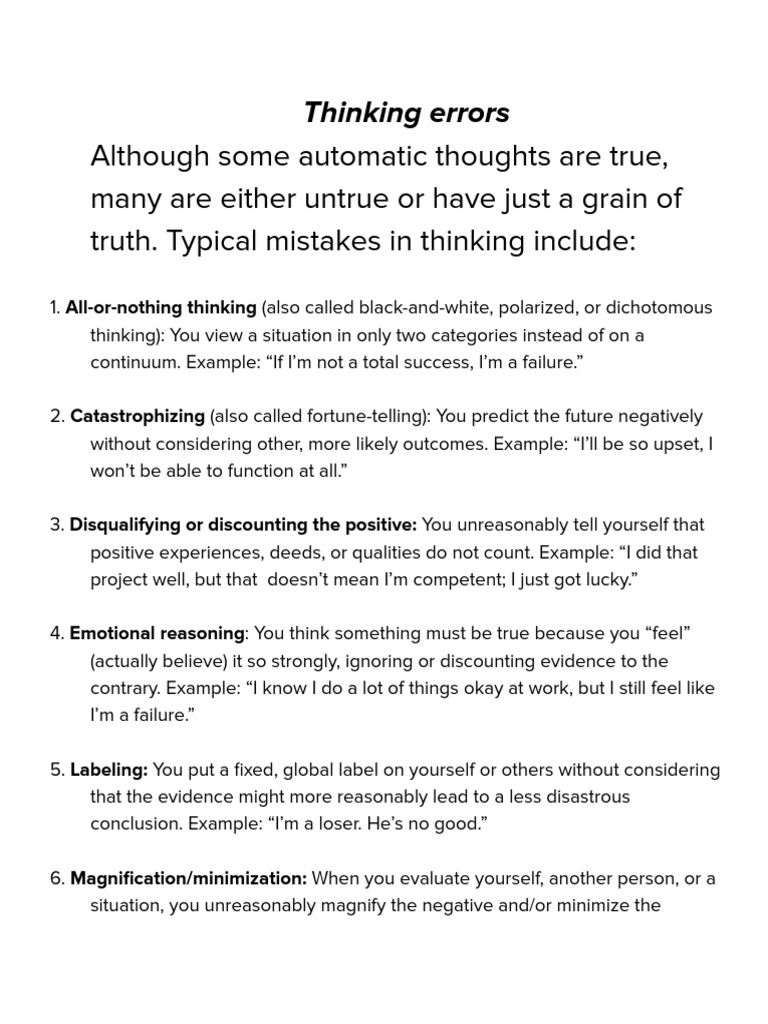In contemplating the teachings of the Bahá’í Faith, one may encounter a profound challenge that often undermines our capacity for reason and spiritual growth: fatal thinking errors. These cognitive distortions can cloud our perceptions and hinder our understanding of both ourselves and the world around us. Understanding these errors and developing strategies to rectify them is essential for anyone seeking a deeper connection to the teachings of Bahá’u’lláh.
Fatal thinking errors manifest in various forms, often leading to misguided conclusions and unhealthy thought patterns. As we delve into these errors, we can better appreciate their implications for our spiritual journey. There are common themes among these cognitive distortions, which warrant careful examination.
One prevalent cognitive distortion is the tendency to engage in all-or-nothing thinking. This perception constrains appreciation for the complexity of life, relegating experiences and individuals to simplistic dichotomies: right or wrong, good or bad. Within Bahá’í teachings, we are encouraged to embrace the idea of unity in diversity. The recognition that multiple perspectives coexist is pivotal for cultivating an open mind and fostering compassion. To counter all-or-nothing thinking, practitioners are advised to adopt a balanced perspective. This can be facilitated through mindfulness practices, which encourage a non-judgmental observation of thoughts and emotions, allowing for a more nuanced understanding of situations.
Another detrimental error is overgeneralization, where individuals draw sweeping conclusions based on isolated incidents. This cognitive trap serves to reinforce prejudices and misconceptions, which is antithetical to the Bahá’í principle of seeking truth through investigation. To mitigate overgeneralization, individuals can engage in critical self-reflection and remind themselves of the multitude of exceptions that exist within any group. The practice of gratitude and the acknowledgment of positive experiences can also help in reshaping these negative thought patterns.
Moreover, emotional reasoning plays a significant role in shaping our perceptions of reality. Often, individuals assume that their feelings are indicative of truth. In the Bahá’í perspective, it is essential to distinguish between emotional reactions and objective reality. A practical approach to overcoming emotional reasoning involves engaging in rational discourse with oneself and others. Asking probing questions about the origins of one’s emotions and challenging their validity can enhance emotional intelligence and foster a more discerning viewpoint.
Another cognitive distortion that warrants attention is personalization, where individuals attribute external events to their own actions, leading to undue blame and self-criticism. This thinking error can be particularly damaging, as it fosters feelings of guilt and inadequacy. In the Bahá’í context, the understanding that we are part of a greater whole can assist in alleviating the burden of personalization. Encouraging individuals to recognize their limitations and the shared responsibility of humanity can create a sense of empowerment, motivating them to contribute positively to society without succumbing to unwarranted guilt.
Furthermore, the tendency to engage in ‘catastrophizing’—exaggerating potential negative outcomes—can paralyze individuals, preventing them from taking constructive action. This error is often rooted in fear and uncertainty, feeding into a narrative of helplessness. Bahá’í teachings emphasize reliance on divine guidance and trust in a higher purpose; cultivating these beliefs can instigate a shift away from pessimism. Practical strategies include focusing on proactive problem-solving and setting achievable goals, thereby shifting the narrative from one of despair to one of hope.
In addition to identifying and addressing these thinking errors, it is crucial to foster an environment that promotes healthy dialogue and reflection. The teachings of the Bahá’í Faith extol the virtues of consultation and the importance of community in nurturing personal development. Engaging with fellow believers or groups dedicated to the exploration of thought patterns can provide valuable insights and alternative perspectives. This reinforces the concept that growth is often catalyzed through shared experiences and diverse viewpoints.
Moreover, the practice of prayer and meditation is integral to the Bahá’í Faith, serving as a means of seeking clarity and understanding. These practices can provide a sanctuary for individuals grappling with cognitive distortions. Silent contemplation allows for introspection and the reconciliation of thoughts and feelings, facilitating a return to a state of mental equilibrium.
One effective approach for rectifying fatal thinking errors is the use of cognitive restructuring techniques. By reframing negative thoughts into more constructive and positive ones, individuals can slowly reshape their mental landscapes. For instance, when encountering a failure, instead of labeling oneself as a failure, one might adopt the perspective that the experience is an opportunity for growth and learning.
In conclusion, the exploration of fatal thinking errors reveals a deeper interaction between cognition and spirituality, accentuating the importance of overcoming these distortions for one’s personal and communal development. The Bahá’í teachings affirm that every individual possesses the capacity for transformation and enlightenment. By developing awareness and employing practical strategies to address cognitive distortions, one not only enhances their personal spiritual journey but also contributes positively to the collective advancement of humanity. The road to clarity and understanding is a continuous one—fostering self-awareness and compassion is paramount on this shared journey toward truth.
